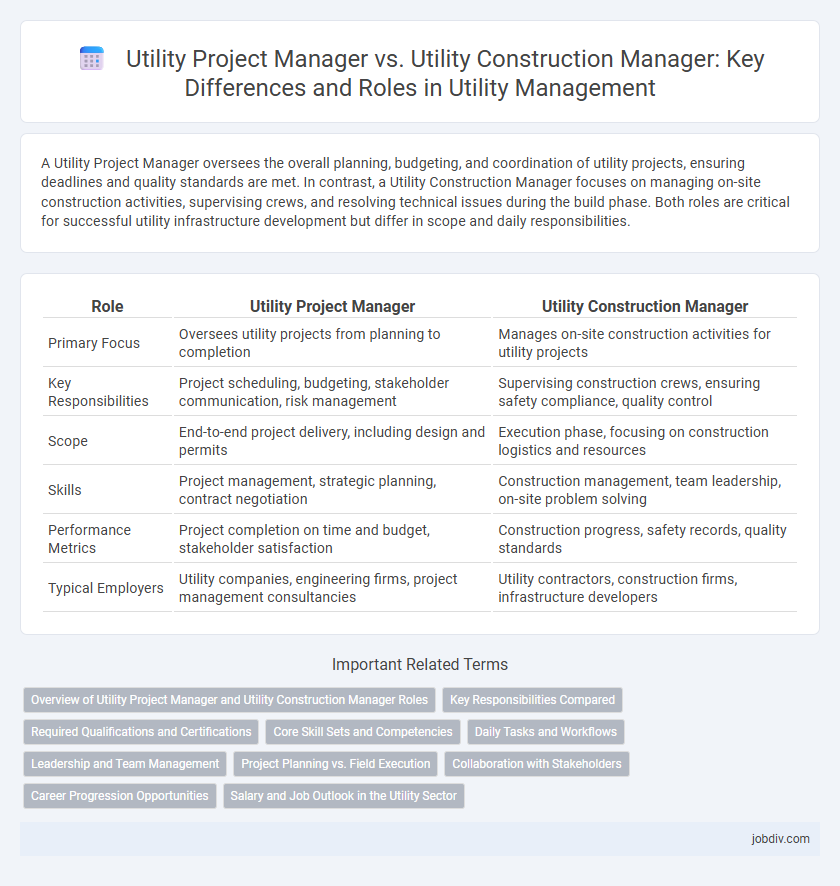A Utility Project Manager oversees the overall planning, budgeting, and coordination of utility projects, ensuring deadlines and quality standards are met. In contrast, a Utility Construction Manager focuses on managing on-site construction activities, supervising crews, and resolving technical issues during the build phase. Both roles are critical for successful utility infrastructure development but differ in scope and daily responsibilities.
Table of Comparison
| Role | Utility Project Manager | Utility Construction Manager |
|---|---|---|
| Primary Focus | Oversees utility projects from planning to completion | Manages on-site construction activities for utility projects |
| Key Responsibilities | Project scheduling, budgeting, stakeholder communication, risk management | Supervising construction crews, ensuring safety compliance, quality control |
| Scope | End-to-end project delivery, including design and permits | Execution phase, focusing on construction logistics and resources |
| Skills | Project management, strategic planning, contract negotiation | Construction management, team leadership, on-site problem solving |
| Performance Metrics | Project completion on time and budget, stakeholder satisfaction | Construction progress, safety records, quality standards |
| Typical Employers | Utility companies, engineering firms, project management consultancies | Utility contractors, construction firms, infrastructure developers |
Overview of Utility Project Manager and Utility Construction Manager Roles
Utility Project Managers oversee the entire lifecycle of utility projects, including planning, budgeting, and stakeholder coordination to ensure timely and cost-effective delivery. Utility Construction Managers focus on on-site construction operations, managing crews, equipment, and ensuring compliance with safety and quality standards during project execution. Both roles are critical for utility infrastructure development but differ in scope, with Project Managers handling strategic oversight and Construction Managers concentrating on operational implementation.
Key Responsibilities Compared
Utility Project Managers coordinate project planning, budgeting, and stakeholder communication to ensure timely completion of utility infrastructure projects. Utility Construction Managers oversee on-site construction activities, enforce safety standards, manage labor and equipment, and resolve technical issues during utility installations. Both roles require strong leadership but differ in focus: project managers emphasize strategic oversight, while construction managers concentrate on operational execution.
Required Qualifications and Certifications
Utility Project Managers typically require a bachelor's degree in engineering, construction management, or a related field, along with certifications such as Project Management Professional (PMP) or Certified Utility Construction Manager (CUCM) to validate expertise in overseeing utility projects. Utility Construction Managers often need hands-on experience in utility infrastructure installation and safety compliance, holding certifications like OSHA Safety Certification and NICET (National Institute for Certification in Engineering Technologies) to ensure construction standards and worker safety. Both roles demand strong knowledge of utility regulations, risk management, and project coordination but differ in emphasis on strategic planning for project managers versus direct site supervision for construction managers.
Core Skill Sets and Competencies
Utility Project Managers excel in strategic planning, resource allocation, and stakeholder communication, ensuring projects meet timelines and budgets efficiently. Utility Construction Managers specialize in on-site supervision, safety compliance, and coordination of construction crews, focusing on executing physical infrastructure work. Both roles require strong leadership, risk management, and knowledge of utility regulations, but project managers emphasize overarching project control while construction managers concentrate on field operations and quality assurance.
Daily Tasks and Workflows
Utility Project Managers oversee the planning, budgeting, and coordination of utility projects, ensuring timelines and regulatory compliance are met. Utility Construction Managers focus on on-site supervision, managing construction crews, equipment, and safety protocols during utility infrastructure installation. Both roles require collaboration with engineers and contractors, but Project Managers emphasize strategic oversight while Construction Managers handle daily operational execution.
Leadership and Team Management
Utility Project Managers lead cross-functional teams by coordinating project schedules, budgets, and stakeholder communication to ensure utility projects meet deadlines and regulatory standards. Utility Construction Managers focus on on-site leadership, supervising construction crews, enforcing safety protocols, and managing daily operations to deliver infrastructure projects efficiently. Both roles require strong leadership skills, but Project Managers emphasize strategic planning and client relations, while Construction Managers prioritize hands-on team supervision and execution.
Project Planning vs. Field Execution
Utility Project Managers concentrate on project planning, including developing timelines, budget forecasting, resource allocation, and regulatory compliance to ensure projects meet strategic objectives. Utility Construction Managers focus on field execution, overseeing daily construction activities, managing on-site personnel, safety protocols, and resolving logistical challenges to guarantee timely and efficient project completion. Both roles require coordination but differ fundamentally in their operational scope, with Project Managers driving planning and coordination from the office, while Construction Managers lead hands-on execution at the site.
Collaboration with Stakeholders
Utility Project Managers coordinate project timelines, budgets, and resources while maintaining communication with engineers, contractors, and regulatory agencies to ensure compliance and project success. Utility Construction Managers focus on on-site supervision, managing crews, equipment, and safety protocols while collaborating closely with subcontractors and inspectors to address construction challenges in real-time. Both roles require effective stakeholder engagement to align project goals, resolve issues promptly, and deliver infrastructure projects efficiently.
Career Progression Opportunities
Utility Project Managers typically advance by overseeing larger portfolios and integrating strategic planning, while Utility Construction Managers progress through mastering on-site execution and technical leadership. Career growth for Project Managers often leans toward senior management roles, emphasizing budget control and stakeholder communication. Construction Managers increasingly move into roles requiring in-depth knowledge of regulatory compliance and field innovation, bridging to project management positions.
Salary and Job Outlook in the Utility Sector
Utility Project Managers typically earn a median salary ranging from $85,000 to $110,000 annually, while Utility Construction Managers often command higher pay, with salaries between $95,000 and $120,000 due to their specialized construction oversight roles. The job outlook in the utility sector for both positions is strong, driven by ongoing infrastructure upgrades and renewable energy projects, with employment growth projected at 6-8% over the next decade. Skillsets including project coordination, regulatory compliance, and budget management critically influence salary potential and career advancement in this sector.
Utility Project Manager vs Utility Construction Manager Infographic

 jobdiv.com
jobdiv.com